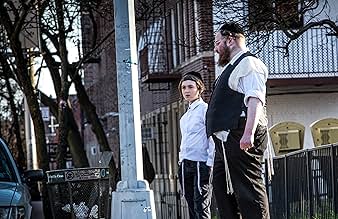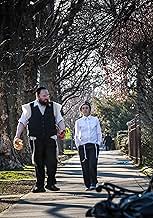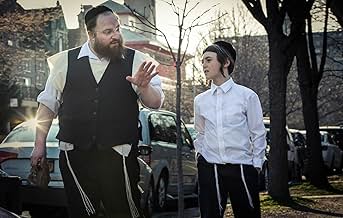ÉVALUATION IMDb
6,6/10
2,7 k
MA NOTE
Ajouter une intrigue dans votre langueWithin Brooklyn's ultra-orthodox Jewish community, a widower battles for custody of his son. A tender drama performed entirely in Yiddish, the film intimately explores the nature of faith an... Tout lireWithin Brooklyn's ultra-orthodox Jewish community, a widower battles for custody of his son. A tender drama performed entirely in Yiddish, the film intimately explores the nature of faith and the price of parenthood.Within Brooklyn's ultra-orthodox Jewish community, a widower battles for custody of his son. A tender drama performed entirely in Yiddish, the film intimately explores the nature of faith and the price of parenthood.
- Prix
- 7 victoires et 18 nominations au total
Meir Ber Schwartz
- The Ruv
- (as Meyer Schwartz)
Melissa Weisz
- Bayla
- (voice)
Avis en vedette
This quiet drama portrays the scuffling life of a man within the Hasidic community in Brooklyn as he endeavors to regain custody of his son in the aftermath of his wife's passing. He is expected to find a new wife and achieve stability as he holds down a low-paying, labor-intensive job as a grocery clerk that drains him of his time and his spirit. He has difficulty keeping his own modest life in order, let alone being strong enough to provide for another human being.
His efforts to better himself in order to regain custody of his son are met with dismissal from those around him, including his more devout and financially stable brother-in-law whom the community has decided should look after the man's son. He gets little encouragement from those within his community, yet he persists.
There is a considerable schism within the Hasidic community that comes to light in this film, especially on account of the man's less-than-pious lifestyle and more secular demeanor. He doesn't readily embrace the hard-line teachings of his sect as forcefully as his peers, but he nevertheless wants what's best for his son and wants to fulfill the requirements of his denomination in order to remain a real father. In that regard, this is an exceptional portrayal of loyalty to one's religious faith in the face of ongoing personal conflict. It's definitely not for many viewers who wouldn't relate to religious doctrine as a deciding force in one's life, but it's still a story that's effectively conveyed and devoid of proselytizing. Recommended to open-minded viewers.
His efforts to better himself in order to regain custody of his son are met with dismissal from those around him, including his more devout and financially stable brother-in-law whom the community has decided should look after the man's son. He gets little encouragement from those within his community, yet he persists.
There is a considerable schism within the Hasidic community that comes to light in this film, especially on account of the man's less-than-pious lifestyle and more secular demeanor. He doesn't readily embrace the hard-line teachings of his sect as forcefully as his peers, but he nevertheless wants what's best for his son and wants to fulfill the requirements of his denomination in order to remain a real father. In that regard, this is an exceptional portrayal of loyalty to one's religious faith in the face of ongoing personal conflict. It's definitely not for many viewers who wouldn't relate to religious doctrine as a deciding force in one's life, but it's still a story that's effectively conveyed and devoid of proselytizing. Recommended to open-minded viewers.
"Menashe" (2017 release; 82 min.) brings the story of a widower named Menashe and his 10 yr. old son Rieven. As the movie opens, it is clear we are in the Hasidic Jewish community in New York, as we see Menashe get to work in a grocery-type store. After work, he joins others in a testy discussion as to what the "real" rules of the Hasidic Jewish community are. It's not long, though, before we learn that Menashe has a son, but, per the Hasidic Jewish rules, he cannot live with Menashe and instead is being raised by the boy's uncle (the brother of Menashe's deceased wife) and his family. Menashe is desperate to see his boy more often, and to get him to return home... At this point we are 10 min. into the movie, but to tell you more would spoil your viewing experience, you'll just have to see for yourself how it all plays out.
Couple of comments: this movie is not the first one about life in the Hasidic Jewish (or Orthodox Jewish) community, yet it is striking once again for someone like myself (a con-Jewish outsider) how incredibly restrictive life is within the confines of that community. The rabbi decides everything. When Menashe appeals to the Rabbi to let his son live with him, the Rabbi responds: "the Torah requires three things: a nice wife, a nice house, and nice dishes", without the slightest of hesitation or irony, wow... The movie reminds of a couple of other movies: "Gett" (the movie about divorce in the Orthodox Jewish community), and... "Kramer vs. Kramer", yes the 1979 classic, where Dustin Hoffman raises his 6 year old boy. Several scenes from "Menashe" are eerily similar. Beware: for whatever reason, the production team of "Menashe" decided to film many scenes in an extreme close-up angle, which at time is quite disorienting (perhaps that was the very intent of it).
"Menashe" premiered at this year's Sundance film festival to immediate critical acclaim, and recently opened at my local-art house theater here in Cincinnati. The Tuesday evening screening where I saw this at was heavily attended. somewhat to my surprise, but this is welcome news. Indeed, if you are in the mood to get a glimpse of what life in the Hasidic Jewish community is really like (almost documentary-like), you will be well-served with this movie, and I'd readily recommend you seek this out, be it in the theater, on VOD or eventually on DVD/Blu-ray.
Couple of comments: this movie is not the first one about life in the Hasidic Jewish (or Orthodox Jewish) community, yet it is striking once again for someone like myself (a con-Jewish outsider) how incredibly restrictive life is within the confines of that community. The rabbi decides everything. When Menashe appeals to the Rabbi to let his son live with him, the Rabbi responds: "the Torah requires three things: a nice wife, a nice house, and nice dishes", without the slightest of hesitation or irony, wow... The movie reminds of a couple of other movies: "Gett" (the movie about divorce in the Orthodox Jewish community), and... "Kramer vs. Kramer", yes the 1979 classic, where Dustin Hoffman raises his 6 year old boy. Several scenes from "Menashe" are eerily similar. Beware: for whatever reason, the production team of "Menashe" decided to film many scenes in an extreme close-up angle, which at time is quite disorienting (perhaps that was the very intent of it).
"Menashe" premiered at this year's Sundance film festival to immediate critical acclaim, and recently opened at my local-art house theater here in Cincinnati. The Tuesday evening screening where I saw this at was heavily attended. somewhat to my surprise, but this is welcome news. Indeed, if you are in the mood to get a glimpse of what life in the Hasidic Jewish community is really like (almost documentary-like), you will be well-served with this movie, and I'd readily recommend you seek this out, be it in the theater, on VOD or eventually on DVD/Blu-ray.
"Menashe" is a semi-documentary, reflecting the case of Menashe Lustig, the actor performed the main character. A film about laws of an ultra conservative community, about parenthood and about life. And , sure, about vulnerable people. Touching and delicate and precise, the work of Menashe Lustig is just admirable. He is the film and I admitt, I saw me reflected in his beautiful portrait of the single father , lost across the challenges, naive and man of good intentions, prisoner of his life. So, a gem . A real special one because it is not a lesson but a confession, honest at whole.
This particular genre is a bit like found footage horror: a lot of new film makers see it as an easy and affordable way of getting their foot in the door.
A restrained but curiously authentic feeling story that is not itself about Menashe getting remarried (as it is often advertized) but more about him dealing with the pressure to do so. There is something horribly feasible in the premise and the writing is naturalistic without ever becoming drab or dull. This is a story you can believe is happening right now in little communities all over the world and it tells this story without sensationalism or soap opera heaviness.
The narrative is fragmented into episodes of Menashe having fun with his son, doing his job and Jewish stuff. It's a serene and rather charming vision into the life of someone is really just a regular guy, he happens to just be part of a particular community he has no desire to subvert or part from, yet find himself victim to the values he has implicitly accepted.
The film is at its most charming when Menashe is with his son. The details of this brand of Judaism which Menashe tries uphold and pass down to him really make the movie memorable and touching while those very same values strive to keep them apart.
This will not be everyone's cup of tea: although nothing transgressive it will simply be too leisurely and uneventful for many people and this is indeed a movie where you just have to feel the moment: the prayers at a cemetery, picking a painting of a Rabbi etc. You may easily find it hard to stay awake or watch this in one sitting. But for what it is, it is pretty much note perfect and leaves you with a powerful sense of the quite desperation and helplessness that so many of us just have to live with.
There is a moment where I was holding my breath, you'll know it when you see it...
A restrained but curiously authentic feeling story that is not itself about Menashe getting remarried (as it is often advertized) but more about him dealing with the pressure to do so. There is something horribly feasible in the premise and the writing is naturalistic without ever becoming drab or dull. This is a story you can believe is happening right now in little communities all over the world and it tells this story without sensationalism or soap opera heaviness.
The narrative is fragmented into episodes of Menashe having fun with his son, doing his job and Jewish stuff. It's a serene and rather charming vision into the life of someone is really just a regular guy, he happens to just be part of a particular community he has no desire to subvert or part from, yet find himself victim to the values he has implicitly accepted.
The film is at its most charming when Menashe is with his son. The details of this brand of Judaism which Menashe tries uphold and pass down to him really make the movie memorable and touching while those very same values strive to keep them apart.
This will not be everyone's cup of tea: although nothing transgressive it will simply be too leisurely and uneventful for many people and this is indeed a movie where you just have to feel the moment: the prayers at a cemetery, picking a painting of a Rabbi etc. You may easily find it hard to stay awake or watch this in one sitting. But for what it is, it is pretty much note perfect and leaves you with a powerful sense of the quite desperation and helplessness that so many of us just have to live with.
There is a moment where I was holding my breath, you'll know it when you see it...
The price tag on fatherhood soars when tradition knocks on your door. Orthodoxy antagonizes the downtrodden, and fortune is monopolized by the most religious adherents. Yiddish mumbles separate father from son. Songs of lament ring through thin apartment walls. The rambunctious laughter of Menashe's child is limited to sidewalk engagements.
Employee of the month every month, Menashe is invaluable to his dictatorial boss at the borough's cultural specific grocery front. This distinction is not established by Menashe's work ethic, but rather by his attention to detail. With Hispanic co-workers, his Hasidic sensibilities garner favor with his Jewish supervisor. Menashe truly desires the best for the customers, and even if the man in charge cannot accommodate, the sentiment is appreciated with stern denials.
Approaching a year since the most bitter sweet loss of his self- contained life, Menashe is finally heeding his Rabbi's instructions, albeit halfheartedly. He submits to uncomfortable appointments in hopes of restoring a household. He is attempting to regain one person, by courting another.
His book speaks of man's inadequacy void of a woman. The Torah crafts a tale of interdependence, and his leadership point at passages to bolster his grief. The community cares for his son above him, and he cares for his son above all else. The walls of domesticity have tumbled, and he is the remaining survivor in Jericho.
A man cannot be expected to run a home and a livelihood, Menashe is reminded by his financially obese brother-in-law. The division in duties is divinely appointed, and Menashe's spiritual juggling can be blamed for his misfortune. His orthodoxy begins to slip. His coat and hat creep out of his closet, and he studies haphazardly.
What Menashe lacks in observance, he corrects with compassion. He is zealous but in an unconventional manner. He mimics his creator when he horses around with his only child. The abandon and whimsy of Menashe infects the boy, and together they create a fuller home than any other formal nuclear family. The uncompromising devotion to one's offspring might just rewrite thousands of years of tradition.
Employee of the month every month, Menashe is invaluable to his dictatorial boss at the borough's cultural specific grocery front. This distinction is not established by Menashe's work ethic, but rather by his attention to detail. With Hispanic co-workers, his Hasidic sensibilities garner favor with his Jewish supervisor. Menashe truly desires the best for the customers, and even if the man in charge cannot accommodate, the sentiment is appreciated with stern denials.
Approaching a year since the most bitter sweet loss of his self- contained life, Menashe is finally heeding his Rabbi's instructions, albeit halfheartedly. He submits to uncomfortable appointments in hopes of restoring a household. He is attempting to regain one person, by courting another.
His book speaks of man's inadequacy void of a woman. The Torah crafts a tale of interdependence, and his leadership point at passages to bolster his grief. The community cares for his son above him, and he cares for his son above all else. The walls of domesticity have tumbled, and he is the remaining survivor in Jericho.
A man cannot be expected to run a home and a livelihood, Menashe is reminded by his financially obese brother-in-law. The division in duties is divinely appointed, and Menashe's spiritual juggling can be blamed for his misfortune. His orthodoxy begins to slip. His coat and hat creep out of his closet, and he studies haphazardly.
What Menashe lacks in observance, he corrects with compassion. He is zealous but in an unconventional manner. He mimics his creator when he horses around with his only child. The abandon and whimsy of Menashe infects the boy, and together they create a fuller home than any other formal nuclear family. The uncompromising devotion to one's offspring might just rewrite thousands of years of tradition.
Le saviez-vous
- AnecdotesDirector Joshua Z Weinstein, who is neither a member of a Haredi community nor a speaker of Yiddish, used a translator on set.
- Bandes originalesIvdu Es Hashem Mit Simcha
Written and performed by Michoel Schnitzler
Courtesy of Michoel Schnitzler
Meilleurs choix
Connectez-vous pour évaluer et surveiller les recommandations personnalisées
- How long is Menashe?Propulsé par Alexa
Détails
- Date de sortie
- Pays d’origine
- Site officiel
- Langues
- Aussi connu sous le nom de
- 我和我的不完美老爸
- Lieux de tournage
- sociétés de production
- Consultez plus de crédits d'entreprise sur IMDbPro
Box-office
- Brut – États-Unis et Canada
- 1 703 036 $ US
- Fin de semaine d'ouverture – États-Unis et Canada
- 62 078 $ US
- 30 juill. 2017
- Brut – à l'échelle mondiale
- 1 962 265 $ US
- Durée
- 1h 22m(82 min)
- Couleur
- Mixage
- Rapport de forme
- 2.00 : 1
Contribuer à cette page
Suggérer une modification ou ajouter du contenu manquant























